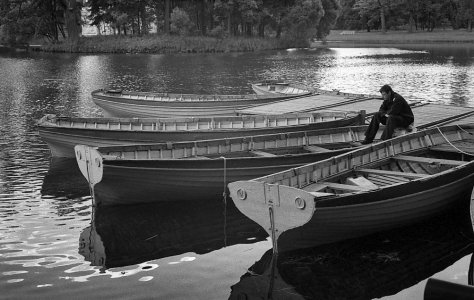You are using an out of date browser. It may not display this or other websites correctly.
You should upgrade or use an alternative browser.
You should upgrade or use an alternative browser.
Kafkaesque
- Thread starter Freakscene
- Start date
- Latest activity Latest activity:
- Replies 248
- Views 13K
agentlossing
Well-known
Wonderful shot.The term Kafkaesque evokes an individual’s sense of finding himself victimised by large impersonal forces, feeling after a while that he can’t but take it personally – and feeling haunted, too, by the sense that maybe, after all, he deserves it. I am getting that feeling now from having started this thread. I must admit to having hoped for more nw than w.
View attachment 4849300
Ки́жи, Russian federation, 2005.
I think you're spot-on about Kafka. His work, for me, contains a lot of the existential neuroticism I get from Kierkegaard, except rather than being directed toward God, as in Kierkegaard's case, it's directed towards the secular State - perhaps, in a way, giving the State the same omnipotent authority over Kafka's soul as Kierkegaard gave to God.
Retro-Grouch
Veteran
Agreed. But whereas Kafka had a wickedly subtle and dark sense of humor that he directed toward the State, Kierkegaard was afraid to laugh at God. What a wuss!Wonderful shot.
I think you're spot-on about Kafka. His work, for me, contains a lot of the existential neuroticism I get from Kierkegaard, except rather than being directed toward God, as in Kierkegaard's case, it's directed towards the secular State - perhaps, in a way, giving the State the same omnipotent authority over Kafka's soul as Kierkegaard gave to God.
raphaellehnen
Established
Freakscene
Obscure member
And let's also remember that within 20 years of his death, Kafka's three sisters were murdered by a State towards which they innately felt more naturally drawn than the first Czechoslovak Republic in which they found themselves living, which in many ways seemed unfamiliar to them. [edit] And Kafka had described and predicted industrialised killing in “In the Penal Settlement”[]. So Kafka was right, and almost prescient. To my knowledge none of Kierkegaard's family was struck down by God, unless you count all deaths, which are inevitable, as 'acts of God', in which case Kierkegaard was still largely wrong because everyone dying is very even-handed, as opposed to the 'single individual' thinking that dominates a lot of Kierkegaard's work.Agreed. But whereas Kafka had a wickedly subtle and dark sense of humor that he directed toward the State, Kierkegaard was afraid to laugh at God. What a wuss!
But I digress. Here is a photo. 'I am here, more than that I do not know, further than that I cannot go. My ship has no rudder, and it is driven by the wind that blows in the undermost region of death.' Kafka 'The Hunter Gracchus'.

Attachments
Last edited:
rhl-oregon
Cameras Guitars Wonders
agentlossing
Well-known
Wise words to live by! I think Kierkegaard resonates so much with me because we live in such an individualistic society in the United States, and are also comparatively heavily religious (after a fashion). So his thinking feels very applicable to my circle, for better and worse.And let's also remember that within 20 years of his death, Kafka's three sisters were murdered by a State towards which they innately felt more naturally drawn than the first Czechoslovak Republic in which they found themselves living and which in many ways seemed unfamiliar to them. So Kafka was right, almost prescient. To my knowledge none of Kierkegaard's family was struck down by God, unless you count all deaths, which are inevitable, as 'acts of God', in which case Kierkegaard was still largely wrong because everyone dying is very even-handed, as opposed to the 'single individual' thinking that dominates a lot of Kierkegaard's work.
Erik van Straten
Veteran
zane0777
Established
boojum
Ignoble Miscreant
OK, rebirth, another spin on the wheel, Kafka lives in Egypt:
Majki
Well-known
Erik van Straten
Veteran
Richard G
Veteran
Poor guy. He bought the wrong glue to glue his hand to the pavement.
rhl-oregon
Cameras Guitars Wonders
rhl-oregon
Cameras Guitars Wonders
FIegiso
Newbie
dourbalistar
Buy more film
Nikon FM2n, AI Nikkor 50mm f/1.8S, Kentmere Pan 400, developed in LegacyPro L110 at 1:31 for 5.5 minutes.

2023.11.20 Roll #342-08355-positive.jpg by dourbalistar, on Flickr

2023.11.20 Roll #342-08355-positive.jpg by dourbalistar, on Flickr















